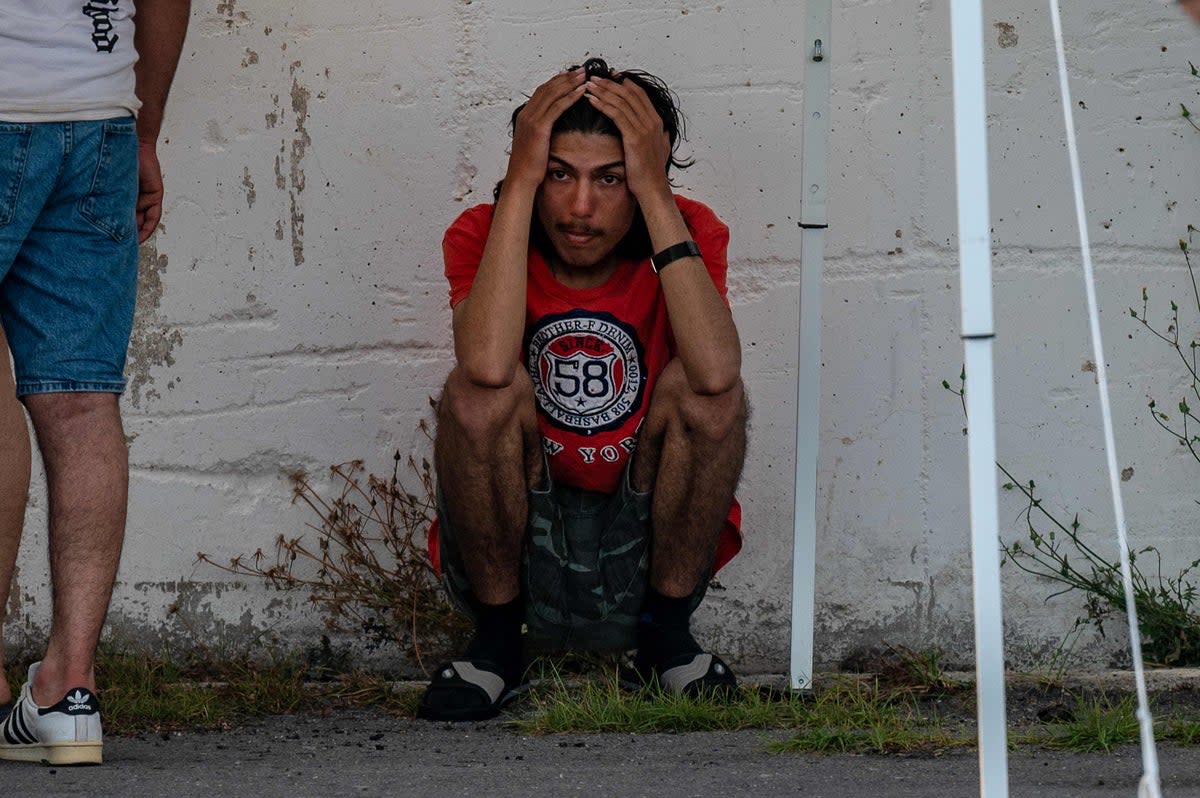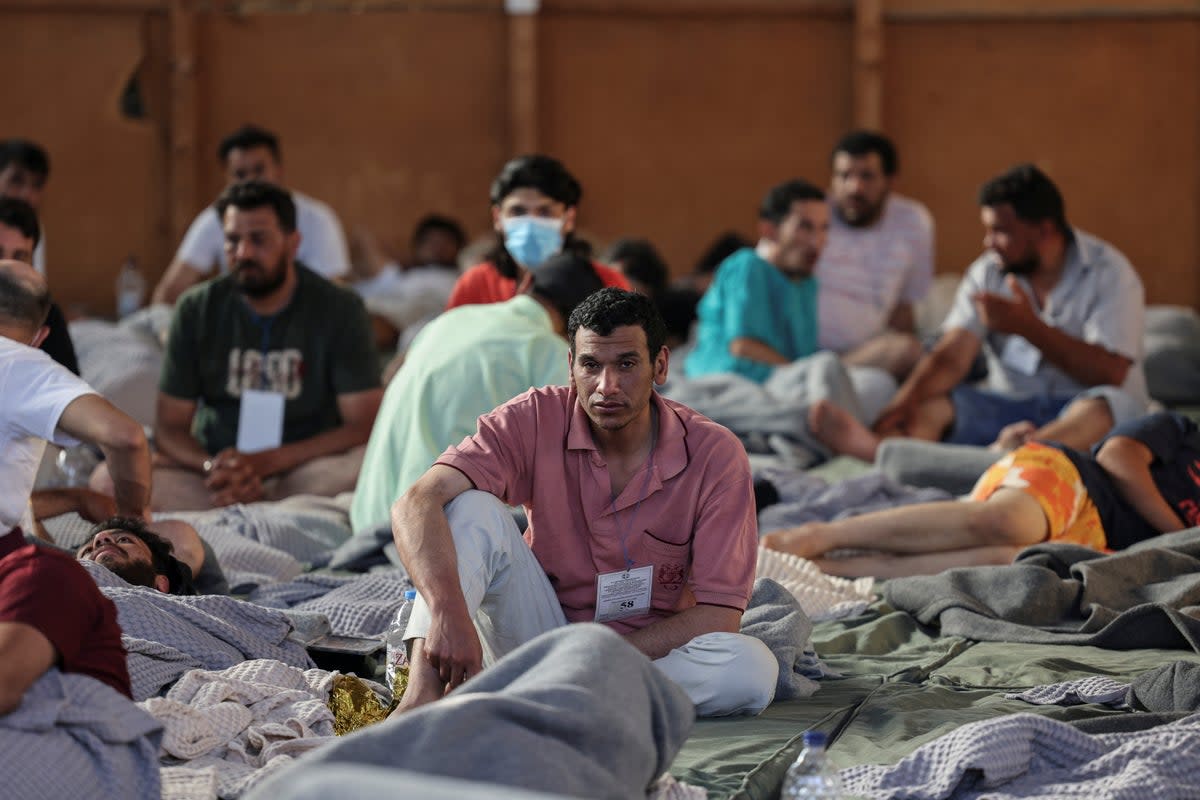Greek boat ‘had up to 100 children’ in its hold as it sank
Survivors from a fishing vessel that sank off the coast of Greece say that up to 100 children may have been on board.
Hundreds are people are missing following the shipwreck, with suggestions that between 400 and 750 people may have been aboard. At least 78 bodies have been recovered so far. Citing initial testimonies from survivors, the Save the Children charity said they believed around 100 children were in the boat’s hold.
When asked by a reporter from Greece’s ANT1 channel if there were 100 children onboard, one survivor replied: “Yes.”
Rescue ships fanned out across the area the vessel went down about 45 miles southwest of Pylos off the Peloponnese coast, as it made its way to Italy from the Libyan port of Tobruk. “The chances of finding [more survivors] are minimal,” retired Greek coast guard Nikos Spanos told state-run ERT television.
“We can assume that many of these children will have lost their lives, as reports of survivors are so far limited. Our deepest sympathies are with the children’s families, and all those affected by this horrendous event,” Unicef said in a statement.
Rescuers saved 104 passengers – including individuals from Egypt, Syria, Pakistan, Afghanistan and Palestine. The search operation will continue for as long as needed, the coast guard said.
Kassem Abu Zeed caught the first flight from Germany to Greece after realising that his wife and brother-in-law were aboard the ship. Relatives of other people onboard also gathered in the southern port city of Kalamata to look for their loved ones.
“The last time we spoke was eight days ago, and she told me that she was getting ready to get on the boat,” Abu Zeed told The Associated Press. “She had paid £5,000 to smugglers. And then we all know what happened.”
The Greek coast guard said nine survivors from the ship were arrested on suspicion of belonging to the smuggling ring that arranged the voyage.
The chances of retrieving the sunken vessel, which had set off from the Libyan port of Tobruk, are remote because the area of international waters where the incident occurred is one of the Mediterranean’s deepest.

Greek prime minister Ioannis Sarmas, who is leading a caretaker government ahead of elections later this month, who had declared three days of national mourning on Wedesnday, said thoughts were with “all the victims of the ruthless smugglers who exploit human unhappiness”. Campaigning has been suspended ahead of the parliamentary election on 25 June and a TV debate due to happen on Thursday was cancelled.
Several marches in protest at the tragedy took place on Thursday evening, including in the capital Athens and the second city Thessaloniki.
Ioannis Zafiropoulos, deputy mayor of Kalamata, where survivors were taken, said there were “more than 500 people” on board.
Independent refugee activist Nawal Soufi said in a Facebook post that she was contacted by people aboard the vessel in the early hours of Tuesday, and that she had been in contact with them until 11pm
“The whole time they asked me what they should do and I kept telling them that Greek help would come. In this last call, the man I was talking to expressly told me: ‘I feel that this will be our last night alive,’” she wrote.
The Greek coastguard said initial contact was made with the fishing boat at 2pm local time on Tuesday, and that no request for help had been made.
A boat carrying migrants capsized off the coast of #Greece. The number of victims may be in the hundreds.
The ship was heading from #Libya to #Italy. There were about 700 illegal migrants on board.
Officially known about 80 dead. More than 100 people were rescued. pic.twitter.com/Lhm7aKWrDo— NEXTA (@nexta_tv) June 15, 2023
Alarm Phone, which operates a trans-European network supporting rescue operations, said it received alerts from people on board a ship in distress off Greece late on Tuesday. It said it had alerted Greek authorities and spoke to people on the vessel who estimated there were up to 750 people on board and appealed for help, and that the captain had fled on a small boat.
Government officials said that before capsizing and sinking around 2am on Wednesday, the vessel’s engine stopped and it began veering from side to side.
Coastguard officers tried to approach the vessel after receiving a request for help, it then “saw the boat take a right turn, then a sharp left, and then another right so big that it caused the vessel to capsize”.
The coastguard has been criticised for not intervening earlier but it said repeated calls to the vessel offering help were declined.
“In the afternoon a merchant vessel approached the ship and provided it with food and supplies, while the [passengers] refused any further assistance,” it said.

A second merchant ship that approached it later was said to have offered further supplies and assistance which were turned down.
On Thursday morning, Greek coastguard spokesman Mr Alexiou said it appeared the vessel capsized after people abruptly moved to one side – shifting the centre of gravity of the 25-30m vessel.
“The outer deck was full of people, and we presume the interior [of the vessel] would also have been full. It looks as if there was a shift among the people who were crammed on board, and it capsized.”
About 72,000 refugees and migrants have arrived so far this year in Europe’s frontline countries Italy, Spain, Greece, Malta and Cyprus, according to UN data, with the majority landing in Italy.
Under a conservative government in power until last month, Greece had taken a harder stance on migration, building walled camps and boosting border controls.
Asked whether Italy was involved in the incident, its interior minister Matteo Piantedosi said on Thursday that the shipwreck occurred in Greece’s search and rescue area. “But that does not mean that Greece is to blame, it is just circumscribing specific areas of responsibility,” he told Italy’s SkyTG24 TV channel.
Greece’s government spokesperson told Reuters that “on illegal migration, EU border states face similar humanitarian disasters and share the same challenges. The biggest of them all is forging a comprehensive EU solution on migration and asylum that respects international law and inclusive humanism.”
The International Organisation for Migration (IOM) has recorded more than 21,000 deaths and disappearances in the central Mediterranean since 2014.
Additional reporting by agencies
